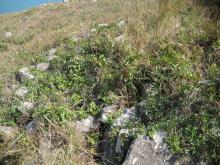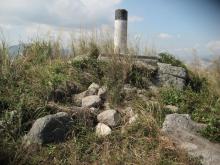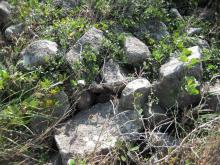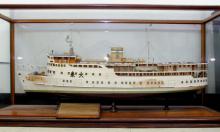Beacon - North Fat Tong (北佛堂墩臺) Tin Ha Shan (田下山) [????- ]
Primary tabs
Submitted by tngan on Fri, 2012-04-13 18:00
The location is approximate. I will update the marker once I have visited it myself later, probably in May. According to JW and other fellow hikers the trigonomatrical station was built right on top of the beacon, covering most of it. Photos could be see under this link.





Comments
Beacon - North Fat Tong (北佛堂墩臺) Tin Ha Shan (田下山)
Dear T, thank you for your effort of promoting the ancient relics. If one day your contributions of geomap /infos attract the public awareness you shall take most of the credits.
BTW, if you would visit the Tin Ha Shan Beacon in May, you can walk along the ridge 20m southerly away from the trigo station (runis of beacon), if looking carefully to the ground of a 3m^2 flat land , you may find out some memorial stone plates, about 8"x8" in size marked with the name of some people who had already past away, this seems to be a kind of special style of memorial plate placed in an "open style" by facing up to the skey instead of erecting upward. You may review carefully the name and the year of the memorial plates to see if the deceased has anything related to the beacon or the local inhabitants.
Re: Grave stones?
JW,
You are welcomed. However the owner of this site (David) is to be credited as he is the one setting up the Google Map Macros. I am just one of the guys submitting tidbits that might be interested to fellow netters.
The concept of the Google Map Macros is that we are using tags to setup correlations between different markers. These tags could be anything, say, districts, approximate locations, point of interest.... If you look at some of the Beacon items now you might have already noticed I have added a few more tags to them so they will show up if someone is browsing for items bearing the same tag.
Oh, back to the stones you just mentioned, I remember the Tsuen Wan Cemetary along the shore also has some modern grave stones facing skyward. Might have to ask some Fung Shui masters specialized on graveyards for the explanation for those in Tsuen Wan, I'm afraid.
I will try to write up something after visiting Tin Ha Shan later. Thanks for the tip.
Best Regards,
T
on - North Fat Tong (北佛堂墩臺) Tin Ha Shan (田下山)
T, oops, I neglected to pay tribute to David! he is of course to be honoured with essential credits.
If you visit the Tin Ha Shan Beacon (main beacon at trigo station), you may also visit the auxillary beacon which is 60m away from the main beacon at south easterly direction - this aux beacon is 4m diameter big masonry structure being hidden by thick bush and shall not be related to things like BBQ stove. For kidding, if you bring a metal detector you may find something interesting inside.
Regards, JW
Re: auxilary beacon
Hi JW,
I have read your descriptions of this auxilary beacon in Hong Kong Hiking Web. I will certain take a look if I could locate it. I will also mark it up if I managed to go there. Hmm.... you have mentioned bullets and metal detector. I know someone here would be having ichy fingers if he reads this thread. Are you saying we might be able to find fragments of ancient arrow heads in the auxilary beacon, which the soldiers might be using to light up the flame?
Thanks & Best Regards,
T
Beacon - North Fat Tong (北佛堂墩臺) Tin Ha Shan (田下山)
T, last time that I visited to the auxilliary station of the North Fat Tong (北佛堂墩臺), the inside of beacon is fairly large, roughly larger than a 12-person dinner table. We had seen some plastic bottles inside and cockcroaches and had not stepped our feet in it for checking, at that time we just focused on the main purpose by viewing from the beacon to other essential directions. If the metal detctor can search out any meaniful substance inside then we can be more confirmed the real purpose of the structure. A more "radical" approach is to apply permit from the relevant govt dept for open-up digging so that any cultural layers under the earth can be reviewed. Any engraved stone or metals would be the tell-tale signs of the real purpose of the structure. However, I would believe govt would be reluctant to grant permit to novice diggers.
Regards, JW
Re: Beacon - North Fat Tong (北佛堂墩臺) Tin Ha Shan (田下山)
Hi JW,
For small sites like these with references by only those local gazzettes, I am uncertain if there are scholars willing to spend their valuable time for a wold goose chase.
On the other hand even for professional archaeologists it woud mean destroying the site itself in the first place, not to mention the layers below. Sort of a dilemma. The vicinity of a popular country trail would also complicate matters.
We would be lucky if the Government could be persuaded to use metal fence to protect those remaining beacons, just like the oval stone ring structures in Fan Lau in Lantau. Don't know how much a public publicity stunt is required. For the general public, if these sites are more well known, it would be abused by casual visits, just like Wong Chuk Kok Jui. Like hugging the 'palm' at low tide? I heard some even climb up to take pictures. Shame on them. Don't they know even climbing up the stone might ware off the surface?
You know, only a very small fraction of fellow hikers are following the mentra of 'Leave nothing behind but your foot steps'.
Oh well.......
Best Regards,
T
Re: Beacon - North Fat Tong (北佛堂墩臺) Tin Ha Shan (田下山)
Dear T
At one time we had written emails to A.M.O. reporting our findings, they replied that we need to provide evidence to substantiate our claims, we need to provide not just the ancient documents but also quite a lot of supportings in order for them "to open a case". Without the open-up investigation it is hard to justify our findings of the beacons are those reported in the ancient documents. The A.M.O. could say to us that those beacons are just stoves for bbq.
In fact they are just a group of civil servants, they would not be that eager to pursue this unless we hikers are a group of professional body representing an archaelogical/researching organization / institution.
JW
Re: Re: Beacon - North Fat Tong (北佛堂墩臺) Tin Ha Shan (田下山)
Hi JW,
I have to agree our little hobby of poking/looking around at the countryside wouldn't seem to satisfy those desk jockies in Government Office. We would be lucky if we are not caught trapassing out there. :-P
I guess we need connections. Maybe some professors in some Universities or the HK Archaeology Society? I guess we could try Professor Siu Kwok-Kin. At least he had published a book called [Forts and Batteries - Coastal Defense in Guangdong during the Ming and Qing Dynasties] back in 1997 with fundings from the Hong Kong Museum of History. I think he is still quite active but darn........ I don't trust Facebook and don't want to register......... Maybe those of you having a Facebook account might like to drop-in, trying to ask politely concerning these and with your photos?
Strange enough, this book did not mention any of the beacon locations in town. Maybe most of them were either defuncted or had been downgraded to lookouts? I don't know......
My 2 cents,
T
Beacon - North Fat Tong (北佛堂墩臺) Tin Ha Shan (田下山)
Dear T,
I don't blame Dr Siu for not able to identify the location of beacons, all in all he is not a pro hiker or a practioner of field researcher, instead he would be more professional in finding and verifying historical documents. I had read his books and had seen his TV's show up but I am sorry to say that I have reservation of his presented talks and materials. If you have chance, try to find his comment about the origin of the name of Hollywood Road and you will understand.
JW